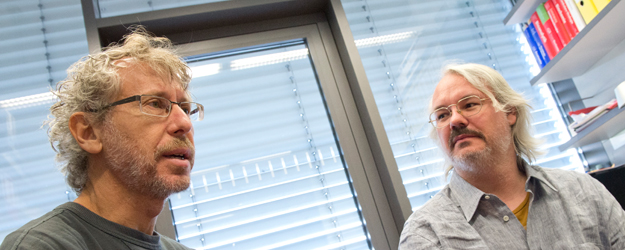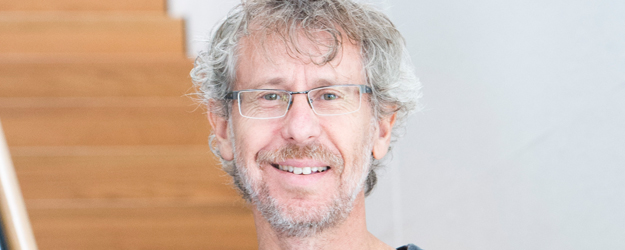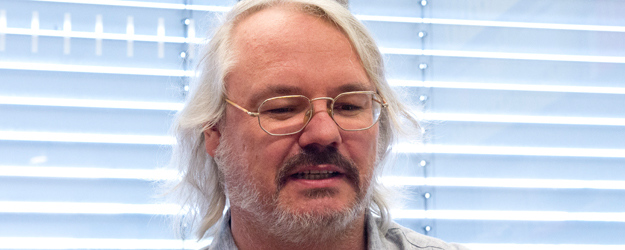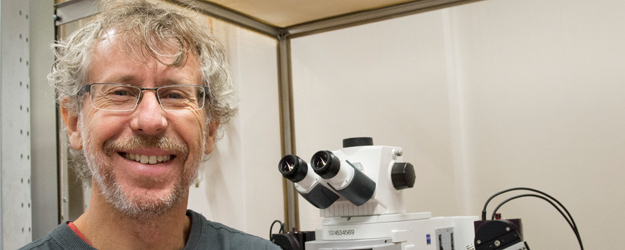14 April 2014
Dr. Alejandro F. Schinder of the Instituto Leloir in Buenos Aires has received a Friedrich Wilhelm Bessel Research Award granted by the Humboldt Foundation for fundamental research that has provided important insight into how new nerve cells are incorporated in the adult brain. The presentation of the award has set in motion a joint international project and Professor Benedikt Berninger of the Research Center Translational Neurosciences at the Mainz University Medical Center intends to cooperate closely with his Argentinian colleague over the next years.
When Dr Alejandro F. Schinder and Professor Benedikt Berninger come together to discuss their research, it is apparent that they have known each other for some time. "In 1997 we were postdoctoral fellows in the same laboratory in San Diego," Berninger remembers. Thereafter, the paths of the two neurobiologists initially separated, but only from a geographical point of view, as they continued to share much the same research interests.
Since 2002, Schinder has been head of the Neuronal Plasticity Laboratory at the Instituto Leloir in Buenos Aires, Argentina and has established his international reputation there. In 2012, Berninger transferred from Ludwig Maximilian University in Munich to the Research Center "Translational Neurosciences" at the University Medical Center of Johannes Gutenberg University Mainz (JGU) to establish a new work group for "Adult Neurogenesis and Cellular Reprogramming."
The hippocampus produces neurons
Both researchers are interested in the processes taking place in a very specific region of the brain. This is the hippocampus, the central 'switching station' of the limbic system in the temporal lobes of mammalian brains. Each brain hemisphere has one hippocampus.
"This is one of the two regions in which neurogenesis occurs, in which new brain cells are formed and integrated into the adult brain," explains Berninger. "Now we intend to find out how these new neurons are integrated into existing neural networks and about their exact function?"
An email from the Alexander von Humboldt Foundation inspired Berninger, who had recently settled in Mainz, to nominate his Argentinian colleague for an award. The aim of the Humboldt Foundation is to honor excellent foreign and German researchers by presenting them with awards to help promote cooperation and the establishment of contacts in both the academic and the cultural fields. "I thought that this could be a major opportunity, not only for the two of us but also for the university," says Berninger. He therefore proposed Schinder for the Friedrich Wilhelm Bessel Research Award, which is endowed with EUR 45,000.
Mainz meets Buenos Aires
This nomination was successful and Schinder arrived from Argentina some days ago to receive his award. He plans to stay on for another two weeks to discuss cooperation between his lab and Berninger's research team in more detail. Further visits are to follow at a later stage. "Some of my team members are also scheduled to come to Mainz to conduct research here," Schinder announces. "And we will fly to Buenos Aires," promises Berninger. "We complement each other perfectly," says the Argentinian. "After all, we conduct research in the same field, although we use different approaches."
Schinder and his team have, for example, managed to track the migration of newly formed neurons in the hippocampus of mice. "We label the cells by inserting fluorescent proteins and we can even manipulate the activity of the neurons using light. They are actually integrating into the existing networks of the hippocampus while they are still maturing, a process that can take several weeks. We are the first to have demonstrated this."
There are indications that there may be a link between the production of new neurons and the ability to handle stress, a phenomenon that is known as resilience – an aspect that is attracting increasing attention within the Mainz research community. "Resistance to stress seems to fall when production is reduced," maintains Schinder. It has also been conjectured that reduced synthesis of nerve cells results in depression. Berninger found that there was enhanced integration of newly formed neurons in the mouse brain when the animals were put into an environment embellished with toys. This is an important aspect that connects the work being undertaken by the two researchers.
Regenerating damaged brain tissue
We already know that new neurons are assimilated into existing networks in the hippocampus – but only in the hippocampus and only in one particular region. "Why is this the case?," asks Berninger. "Could we change that?"
Berninger and his team have indeed managed to manipulate other brain cells with the aid of molecular techniques so that these transform into cells similar to neurons. He calls this a process of 'neuroforging'. "Our aim is to find a way of initiating neurogenesis in brain regions in which it would not normally take place."
"We hope that this will turn out to be a method that can be used to regenerate damaged brain tissue," said Schinder. "The advantage would be that we would not have to introduce exogenous cells as is the case with the alternative method of transplantation." A human patient would provide the cellular material for their own recovery; this would only be coerced into doing something unusual.
"We are currently still looking at the fundamentals," says Berninger. "But this branch of science is developing very fast. With any luck, we will be able to use this approach to treat diseases such as Parkinson's or strokes in about 15 years." Why Parkinson's in particular? "Parkinson's initially affects only one type of brain cell. The challenge is much greater when entire cerebral areas are being destroyed, as for example during a stroke."
Schinder, Berninger, and their teams hope to overcome this challenge in the next few years. The Friedrich Wilhelm Bessel Research Award has provided them with an appropriate boost, kick-starting a promising joint venture that brings together scientists from halfway across the globe.




